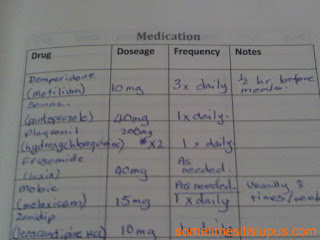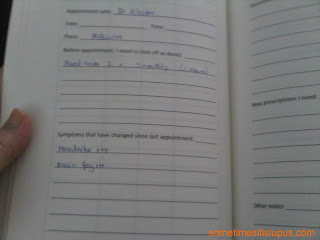So here's two alternative tools you could try to help you manage the barrage of information you need to keep track of to manage your lupus:
The Lupus App
You can find this on Android and iPhone.
It's developed by super-awesome rheumatologist Dr Shashank Akerkar. (What makes him so super-awesome, you ask? Unlike the rheumatologist who charges me $160 per visit, Dr Akerkar actually believes in giving patients information. And he doesn't just give information to his own patients, but puts it out there on the internet for the rest of us as well - for free.)
| Main menu of the Lupus App. |
What you'll find on this app is:
- General information about managing lupus.
- A glossary of the terms your rheumatologist and other doctors are likely to use.
- A place to track all your medications
- A place to track all your doctors' appointments
- A place to keep a summary of your medical history.
- Useful links (including Arthritis Support Board - Dr Akerkar's own site.)
- A place to note symptoms and health concerns to discuss with your rheumatologist.
- An option to email your rheumatologist (if your rheumatologist is the kind that would accept patient emails.)
 |
| Dr Akerkar |
Oh, did I mention you can get the app for free? That's another big plus.
Lupus Book
If you prefer to keep track of things on paper, the Lupus Book may be more your style.
I wrote this to track things for myself. The disadvantage with the book, as opposed to the app, is that it's bigger and bulkier and you need to remember to carry it. The advantage is that you can tuck referral letters, prescription repeats, etc in between the pages, so everything stays together.
 |
| Medication section of the book. |
There is plenty of space for tracking medication, so that as it changes, one line can be crossed out and a new one written in at the end. It's not as neat as changing a line in an app, but you see what changes have happened over time.
The largest section of the book is for appointments.
Each appointment fits on a double page, allowing space for details of which doctor/therapist you are seeing, time and place, as well as things you need to do before the
 |
| Appointments page. |
The idea is to fill in things as the occur to you between appointments. If you notice you're running low on repeats for a medication, write it in the book when you notice, so it's there when you go to your appointment. If you notice a new symptom, write it in the book when it happens, so you don't forget to mention it next visit.
Because it's a book on paper, the publisher would have some problems with it being free, but I can tell you the cheapest place to get it.
You can buy direct from the publisher here: http://www.lulu.com/spotlight/IrisCarden. It costs $12.60 (Australian) plus postage. Because Lulu is a print-on-demand publisher, they usually get the book printed for you in your own country to minimise postage costs and to save the environment the effort of shipping things huge distances.



No comments:
Post a comment
Thanks for being part of the conversation.
Your comment will be visible after moderation.